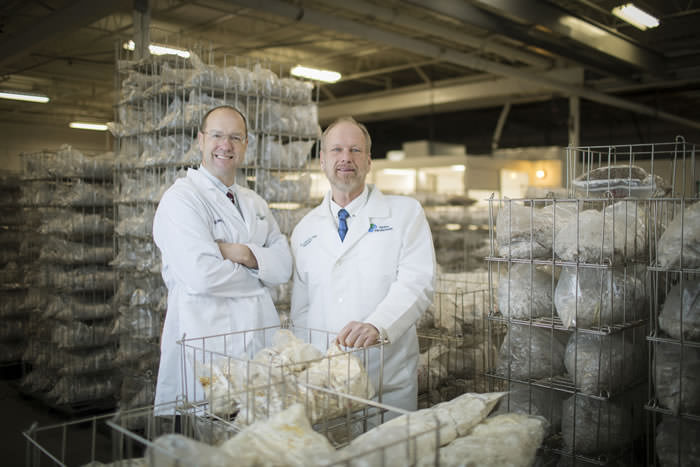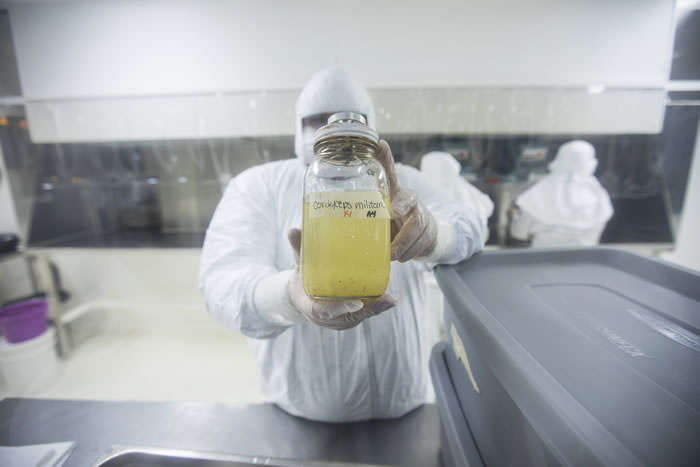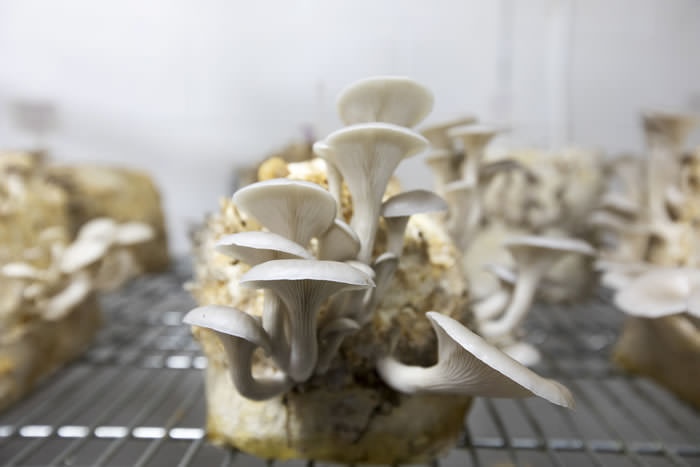feature
MUSHROOM CAPITAL
Medicinal species mega-business puts Carson City on the world stage.
WRITTEN BY BARBARA TWITCHELL
PHOTOS BY JAMIE KINGHAM
There’s a fungus among us. Thousands of them, actually. And, it turns out, that’s a good thing.
On a quiet street in Carson City sits an unpretentious building, home to Aloha Medicinals, a mushroom production and processing plant. But this is no ordinary grower, and these certainly are no ordinary mushrooms. Despite its modest appearance, the inconspicuous, local operation actually is an international superstar of the mushroom world.
Aloha Medicinals is the world’s largest cultivator of medicinal mushrooms and mushroom-derived ingredients, currently supplying products to more than 700 companies in more than 60 countries, for inclusion in their respective pharmaceutical or nutritional formulas.
Lest you mistakenly think that this is a minor accomplishment, consider this: Medicinal mushrooms are, globally, a $25 billion business.

Mushrooms 101
When we hear the word mushroom, most of us think of the culinary or psychedelic kinds. In reality, there are huge numbers of mushroom species, many of which have excellent therapeutic and pharmacological value.
Molds and mushrooms, with their anti-viral and anti-inflammatory properties, have been used by mankind for centuries for their curative and health-inducing capabilities. Chinese medicine, in particular, has long championed the use of mushrooms as health enhancements as well as components in the treatment of diseases. (See related story, “Ancient Chinese Secrets.”[JS1] )
Penicillin, the first true antibiotic, was derived from a fungus and is perhaps the best-known example of its medicinal value. Other widely prescribed drugs actually owe their origins to mushrooms, with statins being a prime example. With an abundance of anecdotal evidence, researchers continue to test the efficacy of specific mushrooms in the treatment of many diseases ranging from arthritis to cancer and even the effects of HIV.
In addition to pharmaceutical usage, mushrooms have a wide range of properties that are purported to increase vitality, immunity, resilience, and general health. Many of these species are primary ingredients in today’s popular nutritional supplements.

Leading the way
Although the medicinal properties of mushrooms have been recognized for centuries, it has only been in the last 20 to 30 years that science has developed the methods necessary for cultivating mushrooms on a large scale in laboratory conditions. According to Mike Brown, president of Aloha Medicinals, the primary person to thank for many of those technological advances is John Holliday, the company’s founder and chief scientific officer.
Interestingly, Holliday, the acknowledged pioneer and premier researcher in this field whom many of his colleagues refer to as “Doc Holliday,” actually has no formal background in medicine. He started his career as a mechanical engineer, working on nuclear submarines on Maui. Fortunately, he also had an interesting hobby: mushrooms.
Holliday used his engineering background to devise proprietary equipment and methods to replicate optimal growth environments for various species of mushrooms. Chief among these was the rarest and most valuable mushroom species, cordyceps sinensis.
The cordyceps mushroom is highly prized for its extremely diverse set of health properties, including increased energy and stimulation of the immune system. It is one of the most well-known — and probably one of the most well-researched — mushrooms.
But perhaps the most interesting thing about cordyceps is how it grows. This species literally grows out of the head of a caterpillar in the rarified, high altitude of the Himalayas. The limitations posed by its natural production is the obvious reason why, historically, it has ranked as the rarest and most expensive mushroom on earth.
Due to the technology developed by Holliday, scientists at Aloha Medicinals were able to successfully reproduce cordyceps under laboratory conditions — minus the caterpillars, of course.
“We actually produce a better-than-nature version,” Brown says. “By putting our proprietary blend together, we’re able to get a product that’s more biologically active than what’s occurring in the wild, for a fraction of the cost. That’s really what’s driving our demand.”
By the numbers
Cordyceps turned out to be the holy grail of success for Aloha Medicinals. Today it’s the company’s biggest product, responsible for 50 percent of its sales. But it is far from being its only product.
“We have more than 800 unique species in our species bank, making it the largest privately owned culture collection of medicinal mushrooms in the world,” Brown says. “At any given time, we have more than 100 species in cultivation and up to 5,000 different cultures being grown or expanded. So if a client needs something, it’s pretty certain we can meet that need quickly and efficiently.”
Aloha manufactures its own line of human dietary supplements, featuring cordyceps as well as several other mushroom species, most notably ganoderma (also called reishi) and hericium (also called lion’s mane). Additionally, the company offers a line of canine products for animal health and well-being.
A small part of its business is selling spawn (mushroom starter material) to local growers and chefs to produce their own culinary mushrooms. Although most often requested are shiitake, lion’s mane, or oyster mushrooms, the company also is able to provide unique strains, allowing area vendors to produce natural, local, and organic culinary products that also are distinctive.
Most of Aloha Medicinals’ business, however, is in the form of bulk sales, with the company boasting a monthly production capacity of more than 40 tons of finished raw materials. Primarily, they supply raw ingredients to the aforementioned 700-plus pharmaceutical and nutritional supplement companies worldwide. In the U.S. alone, 17 of the top 30 nutritional supplement companies currently utilize medicinal mushrooms in their formulas, according to Brown.
Additionally, Aloha Medicinals supplies bulk ingredients to manufacturers that make pre-workout, post-workout, and meal-replacement products, as well as mental health supplements to improve focus and concentration. All of these products use mushrooms in their formulas.
Due to the surge in interest and popularity of these products in recent years, they represent the company’s largest area of expansion. In fact, Brown reports that Aloha Medicinals has doubled in size in the past three years.
Focus on quality
Aloha Medicinals’ outstanding reputation for superior quality control is why it has earned the respect of the health, nutrition, and pharmaceutical industries, according to Brown.
“All of our materials and products are the highest quality, 100 percent American-made, non-irradiated, non-GMO, with natural ingredients, and fully USDA- and EU-Certified Organic, and have been produced, from start to finish, in our state-of-the-art, FDA-certified facility,” Brown says. “We have total control and total traceability. We can validate the DNA of everything we produce.”
A tour through the facility appropriately reflects this high-tech, no-nonsense approach. Don’t bother to look for bobbing mushroom caps — you won’t see any. In fact, it looks more like a science lab or the interior of a spaceship than a mushroom farm.
Inside a controlled, HEPA-filter-clean environment, mushrooms are grown within small plastic bags, monitored by workers in lab coats or spacesuit-type uniforms. All procedures are designed to guarantee the integrity and purity of Aloha’s products. It is almost otherworldly.
Location is key
So how — or more specifically, why — did this mega-business end up in our backyard?
Holliday started the company in 1999 on Maui, and the company was moved to Santa Cruz, Calif., for a few years. But after substantial research, its leaders found the perfect location. In 2007, they moved the entire operation to Carson City.
According to the company website, “The city’s 5,000-foot altitude at the base of the Sierra Nevada is the ideal location for maintaining climate-control growing conditions, including the reduced air pressure necessary for producing the world’s most potent medicinal mushroom species.”
Brown adds that the attractive business environment, good employee pool, and easy access to West Coast markets also factored into the decision, as well as Nevada’s tax-friendly policies.
Ten years after moving here, Brown and the rest of the Aloha team members still are delighted with their Nevada home. The feeling apparently is mutual. Aloha Medicinals was honored with the Governor’s Industry Appreciation Award in 2007 and was awarded the Nevada Excellence in International Business Award in 2008. The company was recognized as Exporter of the Year by the U.S. Department of Commerce, earning that national honor those same two years.
Brown sees a bright future of continued growth and prosperity for Aloha Medicinals. Its acquisition last year as a wholly owned division of American Botanicals has allowed for significant capital investments in order to increase production, he says.
Brown’s optimism also extends to the company’s adopted home in the greater Reno-Carson City area.
“A lot of the biggest supplement nutrition companies are relocating their West Coast manufacturing and distribution operations to Reno, Sparks, and Carson City,” Brown says. “I’ve got seven industrial customers within a five-mile circle of our facility. This area really is becoming a hotbed for nutrition and supplementation.”
And that’s a good thing, too.
Reno writer Barbara Twitchell always has loved mushrooms — at least the sautéed version. She came away from this interview with newfound awe and respect for the many health properties and untapped medicinal potential of these amazing cousins of her dinnertime delight.
For details or to purchase Aloha Medicinals’ nutritional supplements, visit www.Alohamedicinals.com . Supplements also are available through www.Amazon.com


